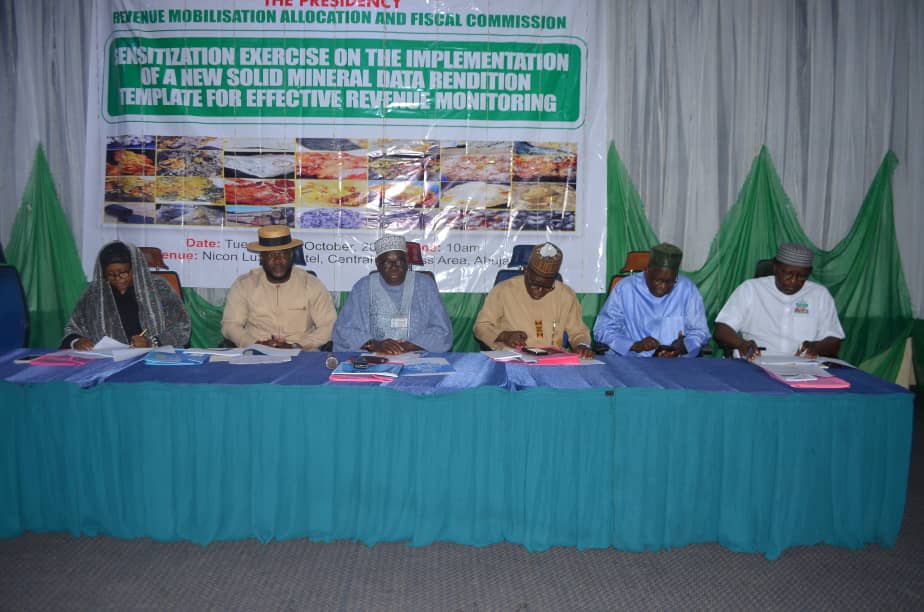Business
RMRDC Boss Reaffirms Commitment to Revolutionize Nigeria’s Raw Materials Value Chain for Optimal Productivity

By Stella Azi and Moyofoluwa Ogunyemi
The Director General of the Raw Materials Research and Development Council (RMRDC), Prof. Nnanyelugo M. Ike-Muonso, has reiterated his commitment to revolutionizing Nigeria’s raw materials value chain to drive optimal productivity, particularly in the agricultural and mineral sectors. Prof. Ike-Muonso made these remarks during a working visit to the Group Managing Director of GTI Capital Group, Mr. Abubakar Lawal, on Thursday, November 28, at GTI’s headquarters in Lagos Island, Lagos State.
Speaking at the visit, the Director General emphasized the Council’s intention to strengthen its partnership with GTI Capital Group, a leading investment bank recognized for its success in advancing the rice and oil palm value chains in Nigeria.
This collaboration is aimed at implementing advanced process technologies across various raw material value chains, boosting industrial input, and reducing post-harvest losses, especially in the agricultural sector. The ultimate goal is to create a self-sustaining national economy that can thrive without heavy dependence on external resources.
Prof. Ike-Muonso highlighted the significant post-harvest losses in Nigeria, particularly in onion production, despite the nation’s comparative advantage in this sector. He emphasized that the partnership with GTI is timely, as it will allow the RMRDC to establish a sustainable framework for raw material production, aggregation, and distribution. The RMRDC brings the technical expertise needed for the project, while GTI provides the structure and financial acumen to drive the entire value chain process.
The Director General further noted that the collaboration will focus initially on the onion value chain, an important economic crop with a variety of derivatives. He revealed that the RMRDC is already actively involved in efforts to improve the onion value chain and is keen to scale up its activities in collaboration with GTI.
Engr. Emmanuel Kwaya, Director of the Technology Development Department at RMRDC, who leads the research team on processing, preservation, and storage of onions to reduce post-harvest losses, explained that around 50% of onions produced in Nigeria are wasted due to inadequate storage facilities. This amounts to an annual loss of between ₦300 billion and ₦500 billion. He stressed the need for support in developing process technologies that enhance value addition and minimize waste from farm to market. Despite Nigeria being the second-largest producer of onions in Africa, producing approximately 2 million metric tons annually (behind Egypt), the country still imports onions worth about ₦35 billion in 2024 alone.
Kwaya also shared the Council’s ongoing collaboration with a private entrepreneur and the Sokoto State Government to process onions into flakes. Currently, the facility produces 100kg of onion flakes and powder daily, but with further intervention, this could increase to 500kg per day. To achieve this, he stated, an investment of ₦150 million is needed to install an onion dryer for processing raw onions into flakes and powder.
Additionally, Kwaya highlighted the partnership with the Sokoto State Government to fabricate onion processing equipment, including machines for slicing, washing, centrifugal dewatering, tray drying, and a water treatment plant, all utilizing indigenous technology.
In his response, Mr. Abubakar Lawal, Group Managing Director of GTI Capital Group, expressed his admiration for Prof. Ike-Muonso’s appointment by President Bola Tinubu, noting that it has renewed public confidence in the RMRDC and revived hope for the country’s raw materials sector. Lawal reflected on the history of the RMRDC, acknowledging its potential as an engine of economic growth in Nigeria. He stated that, in the past, the Council had fallen short of expectations, but with the new leadership under Prof. Ike-Muonso, the vision for a reformed and thriving raw materials sector is becoming a reality.
Mr. Lawal, who was meeting with RMRDC for the first time, commended the Council’s efforts and expressed his eagerness to collaborate with them. He emphasized that GTI, as a venture capital firm with a solid structure and capacity, has the expertise to execute projects that will help transform Nigeria from a raw material-exporting nation into a semi-processed material hub.
He said, “At GTI, we create ideas, implement them, and deliver results. With the right structure in place, this partnership with RMRDC will help us achieve our goal of transforming Nigeria’s raw materials sector. The collaboration will become a catalyst for promoting competitiveness, creating jobs, and energizing the entire value chain ecosystem.”
This partnership marks a significant step toward industrializing Nigeria’s raw materials sector and enhancing its economic potential. By working together, the RMRDC and GTI aim to lay the foundation for sustainable growth in the country’s agricultural and manufacturing industries, addressing critical challenges like post-harvest losses and creating new opportunities for value-added production.
Business
RMAFC Unveils New Data Rendition Template For Solid Minerals

Joel Ajayi
The Revenue Mobilization Allocation and Fiscal Commission, in conjunction with the Federal Ministry of Solid Minerals Development, has introduced a new solid minerals data rendition template for effective monitoring of revenue from the solid mineral sector in Nigeria.
Speaking during a one day sensitisation exercise on the implementation of the new template on Tuesday in Abuja, Chairman of the Commission Dr. Muhammed Bello Shehu OFR who was represented by the Chairman of the Solid Minerals Monitoring Committee of RMAFC at the occassion reiterated the Commission’s commitment to promoting the diversification of the Nation’s revenue sources in line with the Renewed Hope Agenda of President Bola Ahmed Tinubu GCFR, which aims to harness the country’s revenue potentials from other key sectors of the economy such as solid minerals, tourism, manufacturing and the blue economy.
The Chairman who underscored the importance of the new template said, “The implementation of the new data rendition template could not have come at a better time, given the current economic realities the country is facing.
The need to diversify our national revenue sources cannot be overemphasized, especially considering the nation’s over-dependence on hydrocarbon revenues, which are often affected by fluctuations in the international oil market, as well as challenges such as crude oil theft and vandalism.”
Dr. Shehu disclosed that, in line with its constitutional mandate as enshrined in the 1999 Constitution of the Federal Republic of Nigeria (as amended), the Commission had conducted two nationwide solid mineral revenue monitoring exercises in 2016 and 2022 aimed at boosting revenue generation from the mining sector. He added that the exercises had considerably improved the level of revenue generation from the sector.
He, however, lamented that despite the growing scale of activities in the country’s mining sector, only a negligible amount was being remitted to the Federation Account. This, according to him, was largely due to inadequate and ineffective monitoring of mining operations.
He therefore emphasized his determination to make sure that the Commission under his leadership work assiduously to ensure that all revenues due to the Federation Account from the mining sector were fully and promptly remitted into the Federation Account.
The new data rendition template, he explained, was designed to capture and manage relevant information such as the quantity of minerals produced, details of producing companies and their locations, as well as licenses, fees, and permits paid by mining companies.
The Chairman assured that the proper utilization of this data rendition template will enhance transparency and accountability by ensuring that mining operations and revenues are effectively tracked and managed.
In his remarks, Hon. Ibrahim Shettima, Chairman, Solid Minerals Monitoring Committee and Federal Commissioner representing Niger State in the Commission stated that the event was organized to bridge identified gaps to engender the timely and accurate rendition of revenue data on a state-by-state basis by relevant government agencies and operators in the solid minerals sector.
Speaking further, Hon. Shettima explained that the exercise aimed to establish an independent, reliable data platform for the Commission and serve as a credible source for comparison and policy decision-making.
Other stakeholders such as Director Mining Inspectorate, Federal Ministry of Solid Minerals,Engineer Imam Ganiu, D.G Mining Cadestre Office, Engr. Obadiah Nkom and the President of the Miners Association of Nigeria Mr. Segun Ayanleke acknowledged that Nigeria has the potential to be a key player in the global mining industry if the sector is efficiently and effectively managed. They, therefore, called for proper implementation of policies around the sector so as to achieve optimal results. They also advocate for stronger synergy between government and private stakeholders in the sector.
The high point of the event was the presentation of papers by resource persons on the general overview of the global and nigerian mining sectors, assessment of revenue contribution using data rendition, overview of the functions and activities of the Federal Ministry of Solid Minerals Development (FMSMD) as a major economic driver and the functions and activities of the Mining Cadastre Office (MCO).
Papers were also presented on the role and experience of the Miners Association of Nigeria and the new data rendition template as a requirement for accurate and Timely Data Reporting in the Solid Minerals Sector.
-

 Featured6 years ago
Featured6 years agoLampard Names New Chelsea Manager
-

 Featured5 years ago
Featured5 years agoFG To Extends Lockdown In FCT, Lagos Ogun states For 7days
-

 Featured6 years ago
Featured6 years agoChildren Custody: Court Adjourns Mike Ezuruonye, Wife’s Case To April 7
-

 Featured6 years ago
Featured6 years agoNYSC Dismisses Report Of DG’s Plan To Islamize Benue Orientation Camp
-

 Featured4 years ago
Featured4 years agoTransfer Saga: How Mikel Obi Refused to compensate me After I Linked Him Worth $4m Deal In Kuwait SC – Okafor
-
Sports3 years ago
TINUBU LAMBAST DELE MOMODU
-

 News9 months ago
News9 months agoZulu to Super Eagles B team, President Tinubu is happy with you
-
Featured6 years ago
Board urges FG to establish one-stop rehabilitation centres in 6 geopolitical zones
